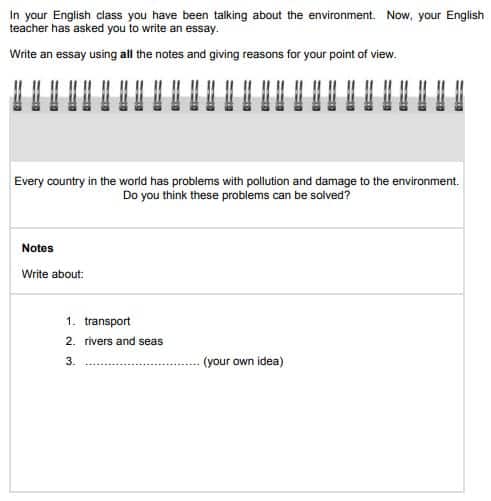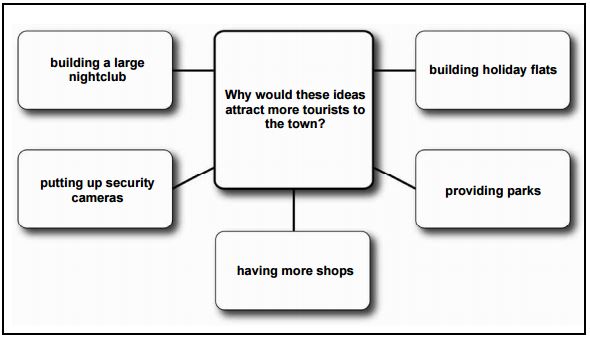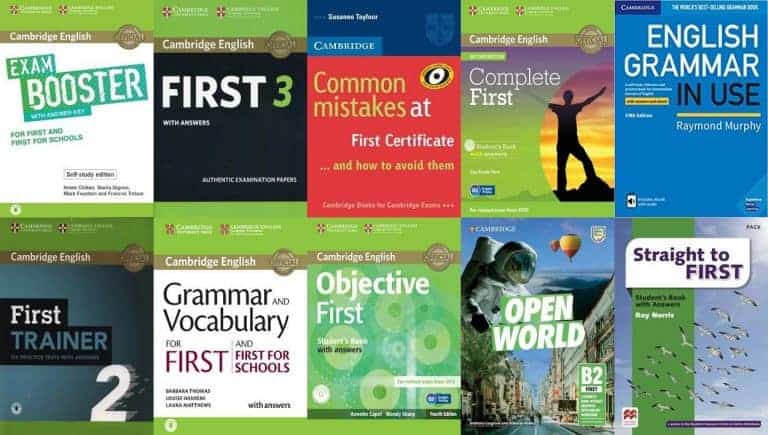Offence wins games, but defence wins championships
The FCE exam is one of the most important language exams in the world. Thousands of people, young and old, take the test each year to find out about their level of English and to get access to better jobs, education or visas in different English-speaking countries.
While there is a lot of information available about the different parts of the exam and the right strategies to do well, many students miss one really important point, and that is how to avoid the most common mistakes that can cost them valuable marks on their way to passing and finally receiving the certificate that they study so hard to obtain over months and sometimes even years.
In basketball they say that offence wins games, but defence wins championships. It’s the same in the FCE exam; techniques and strategies are your offensive tools, but without the right defensive mindset you could be in trouble before you even know it. Don’t make silly mistakes, be prepared!

So, here is my ultimate guide to the most common problems and mistakes I have seen during my time as an English teacher. As the four exam papers are very different in terms of requirements, time, task types etc. I decided to start with Reading & Use of English and then go through the other papers one by one.
Reading & Use of English
For most exam takers Reading & Use of English (R&UoE) is the hardest part. There are a lot of different tasks, a lot of things to remember and definitely not a lot of time so, unfortunately, it is easy to get into trouble and make mistakes.
Some of the most common problems in R&UoE apply to your approach to the whole exam paper while others refer more to just a few parts. Let’s start with the most general issues and then get more specific.
1. Time management

Time management is one of the first problems that come to mind when thinking about R&UoE. Of course, practice helps and once you get more comfortable with the different tasks, you also improve your time management, but if you don’t think about managing your time efficiently, you can get yourself into a world of trouble really quickly.
R&UoE consists of seven parts and you get 75 minutes to complete all of them AND transfer all your answers onto the answer sheet. If we take around five minutes to do just that, you are left with only 70 minutes for seven tasks. You see that you need to be prepared for some time pressure.
My recommendation is that you think about your strengths and weaknesses and then think about how much time you want to spend on each task. Practise the parts individually and do whole practice exams to get a better feel for your personal needs. That way you know what to expect once you take the real exam.
2. Why simply going from task 1 through to 7 is a bad idea
Whenever I have taken exams in my life I would just start at the beginning and work my way through to the end. If there are questions I don’t know the answers to, I skip them and return to them later going through the exam several times. While this approach works for most exams, for example, multiple choice questions, the FCE exam expects you to do so many different types of tasks that you need to think about other ways of going through the parts of R&UoE.
To start with, the tasks are not in any logical order other than the long reading tasks being at the end of the exam paper. You can definitely just go from 1 through to 7 and pass the exam, but it might not be the best strategy for saving time and getting as many marks as possible at the same time. Take a step back and follow Master Yoda’s advice:

If you take just a little bit of time, you see that there are smarter sequences. Some teachers recommend doing the Use of English portion first, which means parts 2, 3 and 4. The reason for this is that most people struggle with Use of English more than with the Reading section so you want to have more time available for the difficult parts.
Another interesting idea is to look at the different value of each correct answer. In parts 4, 5 and 6 you earn two marks for each correct answer while in the other parts your reward is only one mark. Therefore, you can try doing the more valuable parts first and then continue with the rest.
Finally, in parts 1 and 2 we are often in the situation that we either know the answer or we don’t – it’s as simple as that. It can be a good idea to just look at these tasks first and quickly answer the questions you know without thinking too much about the ones you don’t know.
So, don’t waste your time by going into the exam without proper time management. Never go into battle without preparation.

3. There are no punishments in FCE (so don’t be scared)
One of the great things about the exam is that you can make mistakes without getting into trouble…Wait! What??? What are you talking about, Phill?!
OK OK, it’s not that simple, but it is also not that complicated. Of course, you want to give as many correct answers as possible in order to pass the exam. However, there’s also some good news about wrong answers. You don’t lose marks if you make a mistake.
So, I still see a lot of students who leave gaps blank or don’t choose an answer because they don’t know the correct option. My simple advice: Guess the answer! Always answer all the questions and transfer them to your answer sheet because you might be lucky. Remember, a wrong answer and no answer are the same: 0 marks, which means you don’t risk anything by guessing. You can only win. (This is true for the listening exam as well.)

4. Stay focussed until the end
In sports, it sometimes happens that an athlete or a team show a very dominant performance with a comfortable lead, but just before the end they lose focus and the opponent comes back to beat them.
The same thing happens in FCE. Towards the end of the exam many students are just happy that it is almost over and they lose focus. As a result, they forget to check their answers before transferring them to their answer sheet.
Don’t make the same mistake. At the end of every task check your answers (spelling as well, please) to make sure that you don’t get a bad surprise. Stay focussed and sharp and be ready for the kill like this tiger.

Writing
To me, writing is one of the easiest papers to pass in FCE. The different writing tasks are always structured the same way so you can prepare yourself quite easily compared to, let’s say, Reading and Use of English or Listening.
However, there are some traps students tend to fall into and which cost them valuable marks. I have identified the five most common problems in the writing section, but, luckily, you are reading this article so I hope you will be able to avoid making them in the future.
5. This is why students lose marks in their essay
Essay writing is the one task that you have to do in the writing exam. There is no choice for you and while it isn’t easy to write a great essay a lot of people make this one crucial mistake which I see all the time and even after reminding my students of it they still give me their essays with one important part missing.
In every essay task there are three main topic points that you have to deal with. For example, in the task below you can see that you need to write about transport as well as rivers and seas. But wait, there is a third point which says “your own idea” and this is where the problems start.

For some reason, many people simply ignore or forget to include this third topic point in their essay. In the example above we could add tourism, agriculture or any other idea and add another paragraph to the writing task.
Remember the golden rule of organising your essay: Write five paragraphs – introduction, THREE topic paragraphs, conclusion. If you finish you essay and there are only four paragraphs, you know why. Always add your own idea.
6. Never forget the second writing task
It sounds obvious when you read it, but yes, there are two writing tasks in the FCE exam. You might think that there is nothing to worry about, but my experience tells me that too many exam takers focus a lot on the essay and spend a lot of time on it just to start the second part with only 25 minutes left.
I guess it is clear that this it not a good time management strategy. Instead, you have to make sure that you give yourself equal time for each task. This way, you won’t panic and lose valuable marks in an article or review which you normally feel comfortable with. Don’t be like the this poor guy – be ready!

The key to success is to practise the different writing tasks under exam conditions. Time yourself and check how long it takes for you to finish each type of text. Some students prefer to write reports rather than emails so find out which task types come to you more easily. Then, try to improve and get to a point where you need a maximum of 40 minutes to write any given text because 1 hour and 20 minutes is the time limit in the exam.
7. If you fail to plan, plan to fail
Mistake number 7 is closely connected to the previous one, but it is something so common that I had to single it out. Too many students don’t make a plan before they start writing. They just start throwing sentences onto their paper, but then they are surprised that they have to make changes and corrections all the time.
Spending just 3-4 minutes at the beginning to make a plan can save you a lot more time and you will definitely need it towards the end of the writing exam. Just make a list of paragraphs you want to include and add two or three keywords to each one. Now, when you start writing you already know what you actually want to include.

8. Put your organisation into operation
Making a plan is one of the most important things to get yourself ready for the FCE writing tasks. However, the best plan might fail if you don’t follow it and organise your text accordingly.
Unfortunately, I’ve got to see a lot of badly organised writing tasks. Especially at the beginning of your journey to pass the exam it shouldn’t surprise you to get comments from your teacher regarding how the organisation of your writing could be improved.
I usually find two major problems that cost my students valuable marks. Firstly, always organise your texts in paragraphs. Imagine you had to read someone else’s essay and everything was in one giant block. Just like me, you would probably not enjoy reading it that much. So, make sure that every major idea gets its own section.
Secondly, your thoughts should be connected so the examiner can find a logical flow in your writing. To do this you can use specific expressions which link your ideas. The most basic linking words are ‘and, but, because and so’ and even though there are many more (too many to put them all in this article) they should become standard for you. With a little bit of practice it will become second nature and you will just watch the high marks coming in.

9. Lifting heavily won’t make you stronger
In the gym, the heavier you lift, the stronger you get. In the FCE exam, the opposite is true: the less you lift, the higher your marks will be. If this sounds confusing to you, I’m sure you have made this exact mistake before.
Lifting means that instead of using your own words you simply take information from the task and use it in your writing in exactly the same way. You might wonder why this is a problem because it seems to be so much easier to simply put words and expressions from the task in your writing. You can save time and make the examiner’s life easier, can’t you?
Wrong! Examiners look for your own ideas so instead of lifting you should paraphrase which means saying the same thing in your own words. Even at school copying is not allowed so don’t think that you can get away with it in your writing exam. Use your own brain and your own ideas and get the marks you deserve.

10. Not all writing tasks are created equal
Imagine you are a teacher preparing people for the FCE exam. For homework your students had to write a review about a film they like. When you sit down at home to mark the tasks you read the following:
Nowadays people go to the cinema less and less and while there is a trend to staying at home watching Netflix dozens of Blockbusters still come out every year. the question is, are big movies like Avengers: Endgame worth your time and money or not?
Does this look like the introduction to a review how does it remind you of a different type of writing task? To me, this introduction would be okay in an essay. In a review, we expect something a little bit different. Unfortunately, many students mix up the different writing tasks using the wrong type of organization, language and tone. Now look at this introduction for comparison:
The wait is finally over! Avengers: Endgame has hit the theatres and I was really excited to go and watch it with some of my friends. If you want to know if this film is worth your time and money, keep reading because you’re about to find out everything you need to know before you go.
This introduction is more informal, more interesting and more exciting, or to make it short – it’s better. You need to be very careful and study the requirements of each type of writing task. Practise in class and at home and become familiar with what you need to do in order to get high marks.

Listening
I said earlier that writing might be the easiest (or at least one of the easiest papers in the FCE exam). Listening, on the other hand, is definitely one part that most students struggle with. Not only are the tasks difficult as they are, but you also can’t manage your own time and listen to the different parts as often as you want. With these settings come different problems that I commonly witness.
11. Don’t panic!
As you would expect from someone under time pressure, the majority of exam takers find it very difficult to stay calm during the listening exam. If they can’t hear an answer or realise that they have fallen behind the recording, they become very nervous to the point of panic. Believe me, I have seen student who started to cry, swore at the exam (or me), or simply put their pen down and gave up.
Please, don’t make the same mistake. Always remember that you can listen to each recording twice. So, if you feel panic creeping up on you, relax and stay cool and calm. Maybe a little bit of music can help here :).
12. When life gives you lemons…
…make lemonade. In English we use this proverb if we want to stay positive even though the situation seems ‘sour’. And just as people get stuck in difficult situations the listening exam provides you with plenty of opportunities to get stuck, especially when you just can’t hear one answer, and before you know it you missed the next one as well.
My simple tip to prevent this from happening is to remind yourself that you can always listen to the same recording for a second time. But what exactly does that mean for how you should approach the exam? During the first replay of the recording try to listen for as much information as possible, but don’t feel as if you have to find all the answers. Go with the flow and answer the ones you are certain about. Then, during the second round you have time to focus on the more difficult questions without having to worry about the whole exercise again.
13. If you assume…
…you’re normally in trouble. The same goes for the listening exam where students are very commonly surprised by the fact that they look at the questions and possible answers, but then can’t hear these exact words and expressions in the recording.
The people who design the exam know exactly what’s going on so they try to confuse you whenever they can. Instead of using the same words in the task and the listening itself they use synonyms or paraphrase to make the correct answer less obvious.
What does that mean for you? Be aware that what you see on the question paper is probably not what you’re going to get in the recording. In your preparation for the exam try studying synonyms and paraphrasing (very useful for your writing as well – see mistake number 9), expect the unexpected and be ready.

14. The exam is designed to distract you…
…but you are reading this because you are not going to let this happen to you. Closely related to the previous problem, there are different traps that are used in the listening exam to throw you off and trick you into making mistakes. Does that sound unfair to you? It surely is, but you are smart, prepared and ready for battle.
In those tasks that give you different possible answers to choose from you will find that the speaker very often either mentions some or all possible answers in the recording or they talk about something fairly unrelated just to sneak in the correct answer at some point. You need to be aware of this and try not to get distracted by it.
It is very important that you read the questions and underline the most important words before you start listening (you get some time before each task to do that, so don’t worry) so that you know exactly what you will have to listen for. The speaker commonly mentions all the answer options, but only one matches the requirements of the question.
Remember, all of this only works if you don’t know what to do so practise the right strategies and you become distraction-proof like my friend below.

Speaking
Speaking, like writing, provides you with a great opportunity to get good marks. The tasks are always the same so you can practise a lot and it is not so much about your knowledge of grammar and vocabulary like in Reading & Use of English or pure skill like the listening paper. Instead, you can follow basic (and some more advanced) rules to achieve success.
However, I have witnessed many students who, during their exam practice (and later in the official exam), made some smaller and bigger mistakes that rob them of this chance to collect the marks they need to pass.
Don’t let this happen to you. Be smart and keep reading to find out what you want to avoid in the future.
15. You’ll never get a second chance to make a good first impression
I know that everyone who takes the FCE exam is really nervous. Your palms are sweaty, you can’t even remember your own name and it feels as if you have a knot in your stomach. And still, you have to make a good first impression if you want to be successful. As I mentioned earlier, the people at Cambridge design the exam to confuse and distract you, so let’s turn the table and manipulate the examiner a little bit.
OK, we’re not going to put anything in their coffee or use a special perfume or anything like that, but you can try and let your body language set the tone for your exam.
Make sure that you look interested, open and happy. Face the examiner or your partner when you are talking to them, listen carefully, nod if you agree and, most importantly, smile. This will help everyone else in the room to relax and get through the exam more easily. So remember…

16. This is not a payphone, so don’t keep it too short (or make it too long)
The FCE speaking exam starts with some easy questions about yourself, for example, your hobbies, your family, the place where you live, likes and dislikes, etc. All you have to do is to answer these questions. Unfortunately, because it sounds so easy it happens quite often that students give very short or very long answers.
As a rule, aim to speak between 20-25 seconds. This means that you answer the question and add a little bit of extra information like reasons, examples or your personal experience. Practise your timing to get a better feeling for what 20-25 seconds means and you will be fine.
17. Speak until the examiner stops you
I need to be a little bit more exact with this statement. In the first and the fourth part of the speaking exam you have to time yourself, but in parts 2 and 3 the examiner takes the time and tells you when it is time to stop.
At the beginning this might seem a little bit scary. You’re in the middle of your turn in part 2 and suddenly the examiner tells you to stop. You get confused and wonder if you have done something wrong, but believe me when I say that everything is fine. The examiner simply has to stop you and there are no negative consequences.
Actually, the opposite is true. If you stop talking before the time is up, you can lose marks. The examiner wants you to show that you can talk about a specific topic for a set period of time. It isn’t about your opinion or what exactly you have to say, but rather how you say it. So, be brave and talk until the examiner stops you.

18. Oh no, there’s a question in Part 2?!
In Speaking Part 2, the most common mistake I see is that students get caught up in comparing the two photos and run out of time before they can really answer the question that comes with the task.
Always remember that there are two things you have to do in this part of the speaking exam: comparing two pictures AND answering a question. If you talk about just one of them, you have a problem.
But how can you deal with this? Make sure that you allocate around 20-25 seconds of your turn to comparing the pictures. Point out the biggest similarity and the biggest difference and that’s it. The rest (35-40 seconds) can now be used to answer the question.
Finding the right timing takes a lot of practice, but you are reading this article so I guess you are willing to put in the work…well done! 🙂
19. Compare, don’t describe
Tied with the previous problem for most common mistake in Speaking Part 2 is this one. Students look at the two photos and simply tell the examiner what they can see. So far, so good, but the examiner already knows what the pictures look like. They asked the student to compare the photos and not to describe them.
Comparing two things has a different quality than simply describing them. You have to speculate, deduce and put the two situations side by side based on what you can see. A person is smiling? She might be happy. A group of children are running around chasing after a football? They might be having a good time. Can you be sure of those things? No, you can’t, but you can speculate without only describing that the kids are running around.
As mentioned before, use 20-25 seconds of your turn for the comparison. You won’t have a lot of time anyway so don’t waste it. Get to the point and get your marks.
20. We call it useful language because it is useful
By now, you are probably completely insecure doubting yourself and your ability to ever pass the exam because of all the problems I’m pointing out to you. The good news is that there is a lot of useful language that you can and should use in the speaking exam. It is a little bit like Batman’s belt in which he carries all his cool tools and weapons.

If you use this kind of language it becomes clear to the examiner what exactly you are trying to express and you tick one box after another on your way to high marks.
21. Don’t forget your partner
The speaking paper in the FCE exam is usually taken in pairs (sometimes in groups of three) and while the first two parts require you to talk by yourself or with the examiner, the second half includes a lot of interaction with your partner. This is great because for many people it feels better to take the exam with another person, but it can also be tricky as there are different ways to forget that there is someone else doing this with you.
A lot of students feel as if they have to speak as much as possible so they take away valuable time from their partner. The problem with this is that both candidates lose marks, one for not displaying their skills and the other for not involving their partner.
I always tell my students to treat the interaction in the speaking exam as a game of badminton or ping pong. I remember that, when I was a child, I would play these games a lot with my friends and we always tried to keep the ball in the air for as long as we could trying to break our own record every day. Try to keep the ball in the air by involving your partner. Ask them for their opinion, invite them to share their view and respond to what they say. Be a team!

22. Less is sometimes more
In the third part of the speaking exam you have to discuss a question talking about five different ideas given to you by the examiner. The task could look something like this:

Now, a lot of students feel that they have to discuss all five prompts so they try to talk really fast in order to get to the end quickly. What they often misunderstand is that they don’t have to talk about all five points. In fact, examiners like it more if you talk about fewer topics but do so in more detail. This gives you the chance to involve your partner more and to show your language skills better, and if that doesn’t sound like good news, then I don’t know what does. 🙂
23. Discuss, don’t decide (yet)
Speaking part 3 is tricky because there are two halves to it. First, you have to discuss the question and the five prompts and then you have to make a decision based on the same five topic points. This seems very easy at first, but the two parts can easily be confused. More often than I would like to I listen to pairs trying to make decisions during the first part even though they only have to discuss the question.
It is difficult not to fall into this trap, but you have to be aware that, in the first part, you have to look at each single point in isolation and only in the second part can you start to compare them. If you keep this in mind, you will cruise through this part.
24. Be a good listener
It is great if you know how to express yourself in a foreign language. You put everything you know together: grammar, vocabulary, intonation, pronunciation, speed and a logical order of ideas. Once you are able to do all of this quickly and with ease you are considered fluent. Congratulations!
The other part of speaking, however, is listening to the other person. And this is where many people struggle. I am definitely at fault, too, (ask my girlfriend about it) and I work on this every day, but in an exam like FCE you don’t have the luxury of working on it. You have to be able to respond to your partner on the spot so listen carefully to everything they say. The examiner might ask you if you agree or not, especially in the last part of the speaking exam. Make yourself, your partner and the examiner happy and be a good listener.
25. Support is everything
I left the last mistake for the end of the article because I think it might be the most important one to keep in mind when taking the exam. Imagine you’re having a conversation with someone you’ve just met at a party and you’re asking your new friend a few things about themselves like where they are from, things about their family, friends and hobbies and, later on, even about politics or other more abstract topics.
And now imagine your friend only gives you one-sentence answers. Wouldn’t you feel like you’re not getting enough information? Wouldn’t you want to get some more details, reasons, examples, personal experiences?
Yeah, that’s what the examiner feels like when a candidate doesn’t support their answers. The difference between those two situations is that you will probably not catch up with your ‘friend’ any more while the examiner can actually punish you for failing to give additional detail.
So, whenever you answer one of the examiner’s questions or respond to your partner make sure that you fully inform them. Support is everything!
Let’s conclude
Well, there you have the 25 most common mistakes in FCE and how to avoid them. I hope my ideas will help you get ready and be prepared for the exam. I know there is a lot to think about, but if you start practising early and a lot, I’m sure you can avoid all of these traps and succeed.
Lots of love,
Teacher Phill 🙂







